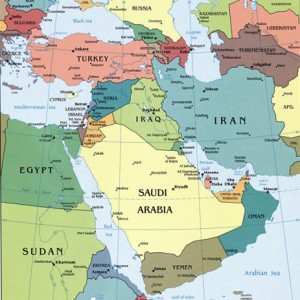The United States has moved significant military reinforcements into the Persian Gulf in order to intimidate Iran and increase the number of fighter jets capable of striking the Islamic Republic after a partial breakdown of nuclear talks last month.
 “The message to Iran is, ‘Don’t even think about it,'” one senior Defense Department official told the New York Times. “Don’t even think about closing the strait. We’ll clear the mines. Don’t even think about sending your fast boats out to harass our vessels or commercial shipping. We’ll put them on the bottom of the gulf.”
“The message to Iran is, ‘Don’t even think about it,'” one senior Defense Department official told the New York Times. “Don’t even think about closing the strait. We’ll clear the mines. Don’t even think about sending your fast boats out to harass our vessels or commercial shipping. We’ll put them on the bottom of the gulf.”
Much of the motivation for expanding the military presence around Iran is to placate hysterical Israeli concerns, expressed in public as an apocalyptic fear of make-believe Iranian nuclear weapons. The reinforcements are meant to show Israel that, as one senior Obama administration official put it last week, “When the president says there are other options on the table beyond negotiations, he means it.”
The build up, planned for at least a year, comes mainly in the form of Navy warships and minesweepers patrolling the waterway to the south of Iran. The Obama administration has also put stealthy F-22 and F-15C warplanes into two separate bases in the Persian Gulf.
“Those additional attack aircraft give the United States military greater capability against coastal missile batteries that could threaten shipping, as well as the reach to strike other targets deeper inside Iran,” reports the New York Times.
US policy toward the region is now primarily about militarily threatening Iran by surrounding the country with readied forces and weapons. Iran also faces harsh US-led economic warfare in the form of a sweeping oil embargo, to the detriment of the Iranian people.
The stated justification for this aggressiveness is Iran’s supposedly disputed program. The problem is that nobody disputes, including the whole of the military and intelligence community, the fact that Iran doesn’t have a nuclear weapons program and has demonstrated no intention to start one.
Washington’s posture is a bid to dominate the world’s most economically important region. When Obama accelerated the deployment of warships to the Gulf in 2010, the New York Times described it as “part of a coordinated administration strategy to increase pressure on Iran” and also “intended to counter the impression that Iran is fast becoming the most powerful military force in the Middle East.”
Onboard the USS Abraham Lincoln in the Gulf’s Strait of Hormuz last February, BBC reporter Jonathan Beale explained, “This carrier and these [fighter] jets are more than just a show of force, they’re here to send a clear message to Iran as to who really controls these waters.”
The centrality of oil markets in the US confrontation with Iran is instructive here. Much of the conflict is based on a power play from Washington to try to neuter Iran’s regional influence and make them obedient.
In a secret memo on Iran written in 1982 to the National Security Council, this centrality was spelled out. “The importance of the Gulf region to the US resides largely in its oil,” said the memo. “The power to interrupt the supply of this [oil] flow entails the power to wreak havoc on the economies of the west.”
The memo explains “whoever is in control of the Gulf’s” oil, “is in a position to have a very large political as well as economic influence in the world.” Iran’s war with Iraq at the time raised concerns in Washington that a possible Iranian victory could lead it to “exert influence” over Iraq and Kuwait and even Saudi Arabia.
“We may soon be faced with a situation,” the memo continues, “in which a significant portion of the oil supplies to the West are heavily influenced by Iran or by political forces hostile to the West or by forces unable or uninterested in maintaining the flow of oil.”
The same fundamental calculus remains today. Sanctions in response to Iranian achievement of nuclear capability elicits such a strident response from the US not because of any fears that Iran would use the bomb, but because that sort of deterrent helps eliminate Washington’s “avenues for regime change” and thus increases Iran’s leverage over US attempts to maintain dominance in the Middle East.


